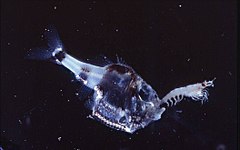Sternoptychinae
| Marine hatchetfishes | |
|---|---|
 |
|
| Half-naked hatchetfish, Argyropelecus hemigymnus with a crustacean | |
| Scientific classification | |
| Domain: | Eukaryota |
| Kingdom: | Animalia |
| Phylum: | Chordata |
| Class: | Actinopterygii |
| Order: | Stomiiformes |
| Family: | Sternoptychidae |
| Subfamily: | Sternoptychinae |
| Diversity | |
| 3 genera, some 40 species | |
Marine hatchetfishes or deep-sea hatchetfishes are small deep-sea mesopelagic ray-finned fish of the stomiiform subfamily Sternoptychinae. They should not be confused with the freshwater hatchetfishes, which are not particularly closely related Teleostei in the characiform family Gasteropelecidae.
The scientific name means "Sternoptyx-subfamily", from Sternoptyx (the type genus) + the standard animal family suffix "-inae". It ultimately derives from Ancient Greek stérnon (στέρνον, "breast") + ptýx (πτύξ, "a fold/crease") + Latin forma ("external form"), the Greek part in reference to the thorax shape of marine hatchetfishes.
Found in tropical, subtropical and temperate waters of the Atlantic, Pacific and Indian Oceans, marine hatchetfishes range in size from Polyipnus danae at 2.8 cm (1.1 in) to the c.12 cm (4.7 in)-long Giant hatchetfish (Argyropelecus gigas). They are small deep-sea fishes which have evolved a peculiar body shape and like their relatives have bioluminescent photophores. The latter allow them to use counter-illumination to escape predators that lurk in the depths: by matching the light intensity with the light penetrating the water from above, the fish does not appear darker if seen from below. They typically occur at a few hundred meters below the surface, but their entire depth range spans from 50 to 1,500 meters deep.
...
Wikipedia
